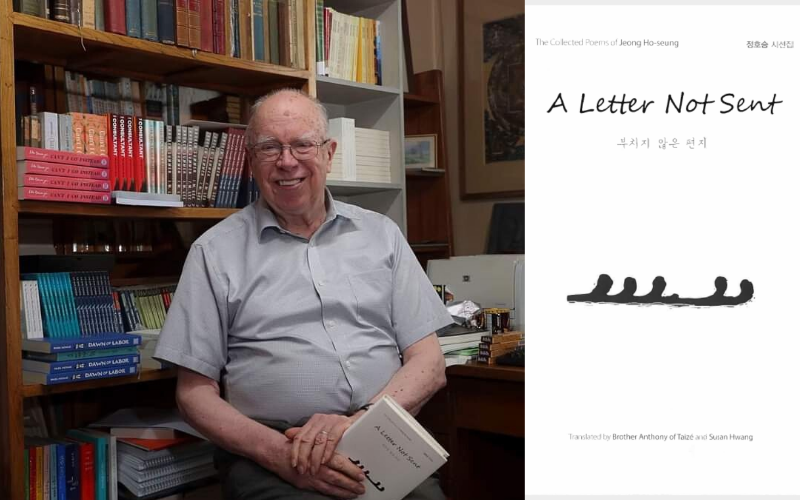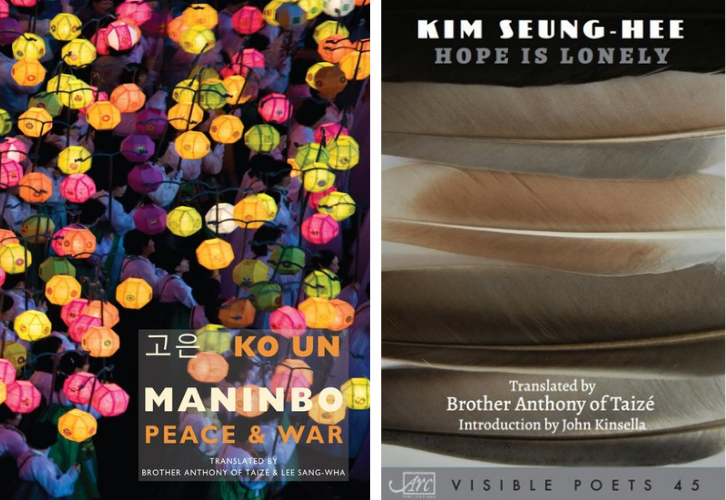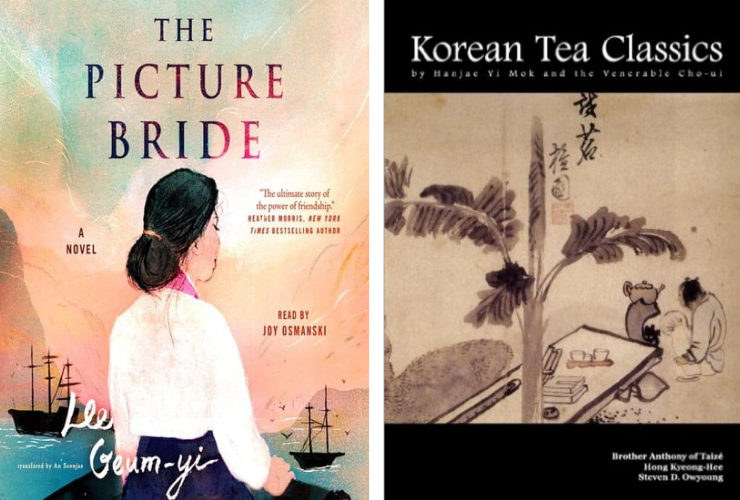- 한국어
- English
- 日本語
- 中文
- العربية
- Español
- Français
- Deutsch
- Pусский
- Tiếng Việt
- Indonesian
By Honorary Reporter Imane Bouhnika from Algeria
Photos = Brother Anthony An Sonjae
Brother Anthony, 82, now based in Seoul, is this year's winner of the domestic Manhae Literary Prize for his contributions to literature with over 60 translated works. The award honors those who embody the principles of Han Yong-un, a Buddhist reformer and independence activist.
Born Anthony Graham Teague in the U.K. and a graduate of Oxford University, Brother Anthony, whose Korean name is An Sonjae, in 1969 joined the Taizé Community, an ecumenical Christian monastic order in France, and moved to Korea in 1980 to teach at Sogang University.
He became a professor in 1985 and dedicated himself to translating the works of leading domestic poets like Ko Un, Kim Kwang-kyu and Kim Seung-hee as well as famous novelists like Yi Mun-yol, Im Seong-sun and Lee Geum-Yi.

Brother Anthony poses with his translation of poet Jeong Ho-seung's collection "A Letter Not Sent."
In addition to Manhae, Brother Anthony has earned other honors like the Korean government's Order of Merit for Culture, Republic of Korea Literary Award (Translation), Daesan Award for Translation and Korea PEN Translation Prize.
The following are excerpts from an email interview with him from Sept. 28 to Oct. 4.
What initially inspired you to become a translator of Korean poetry and literature?
After moving from my native England to France in 1966 and joining our Community of Taizé in 1969, I became active in translating from French into English as a way of serving the community's universal vocation of reconciliation. After coming to Korea and beginning to teach English literature at Sogang University, I felt the need to discover and translate contemporary Korean poetry. I knew that very few people were doing it and that Korean literature was almost unknown to the outside world.

Ko Un's "Maninbo: Peace and War" (left) and Kim Seung-hee's "Hope is Lonely" are two of the translator's many works.
The Korean language, especially its poetic language, is very different from English and a translated poem will always look and sound completely different, yet it somehow has to be the same poem. The order of words and phrases very often has to be reversed. Often there is no clear subject in Korean, so it can be hard to know who is speaking or acting. The rhythms of Korean seem to delight in onomatopoeia, something that has no equivalent in English, and Koreans don't understand why the sounds of a translation don't imitate the Korean. A translated poem has to be an English poem. It cannot remain Korean in its style or language or rhythms that only exist in Korean.
How do you approach capturing the essence of Korean poetry in your translations?
The translator's main task is to produce an English poem that works as poetry in English. Many poems beloved in Korea have no impact at all when translated, no matter how faithfully or playfully, because the world of poetry in English is unlike that in Korean. While trying to follow the literal meaning of the Korean words, I have to find ways of saying the same thing differently. A good translation is faithful, readable and enjoyable. The translation will be a different poem while still being the same poem.
What work or author has left a lasting impression on you?
I have a special affection for Cheon Sang-byeong, whom I've never met. Jeong Ho-seung and I are close, we share the same birthday and his poems are fine. And I'm fond of the younger poet Sim Yong-mok. I used to enjoy meeting my first poet, Ku Sang.
Shin Kyeong-nim's "Farmers' Dance" is a very powerful collection, and I have much admiration for Ko Un's "Maninbo" poems, which I consider a remarkable achievement. I only feel sorry that I've not translated more works by female poets, but this wasn't deliberate.
Tell the story of how you got your Korean name Sonjae.
The Buddhist sutra Gandavyuha, which is usually at the end of the Avatamsaka Sutra, tells of the travels of a young boy, Sudhana, in search of enlightenment. He meets 52 teachers, many kinds of people and beings, each of whom teaches him something. Ko Un adapted that as a Bildungsroman (genre that follows the psychological and moral growth of a protagonist from child to adult) form of story, giving it the title "Little Pilgrim." The Korean form of the child's name is Seon-jae, and since my English name is Anthony, I took the similar-sounding name An Sonjae after getting Korean citizenship in 1994. I'm also a little pilgrim in that I learn much from many people.
Any character or quote from Korean literature that deeply moved you?
"I'll go back to heaven again. At the end of my outing to this beautiful world, I'll go back and say, 'That was beautiful.'" (Cheon Sang-byeong)
Given Korean literature's rise abroad, how can translators shape its future and introduce it to a global audience?
We must see whether artificial intelligence can produce convincing, faithful literary translations. Otherwise, individuals will have to keep trying to transform works written in Korean and then find publishers who think they can sell them. Fiction is today's main genre, so Korean fiction must appeal to non-Korean readers if it wants to find translators and publishers as well as readers.

Brother Anthony translated into English "The Picture Bride" by Lee Geum-yi (left) and "Korean Tea Classics" by Hanjae Yi Mok and the Ven. Cho-ui.
What translation do you think best shows the depth of Korean culture and history?
Hawaii University Press recently published our translation of Park Nohae's poems "Dawn of Labor," which was originally published in 1984. This work gives a poignant voice to the suffering of young factory workers in the 1980s. It had tremendous impact and sold nearly a million copies, and the students of the time found it deeply inspiring. It's strange that it wasn't translated earlier as its message of hope and aspiration remains very up to date and has a universal appeal.
msjeon22@korea.kr
*This article is written by a Korea.net Honorary Reporter. Our group of Honorary Reporters are from all around the world, and they share with Korea.net their love and passion for all things Korean.